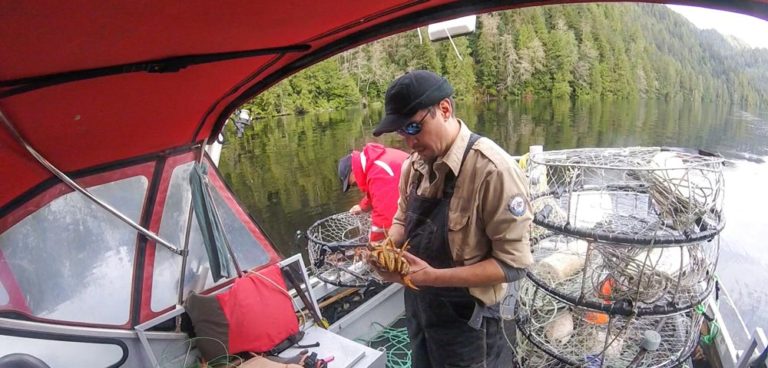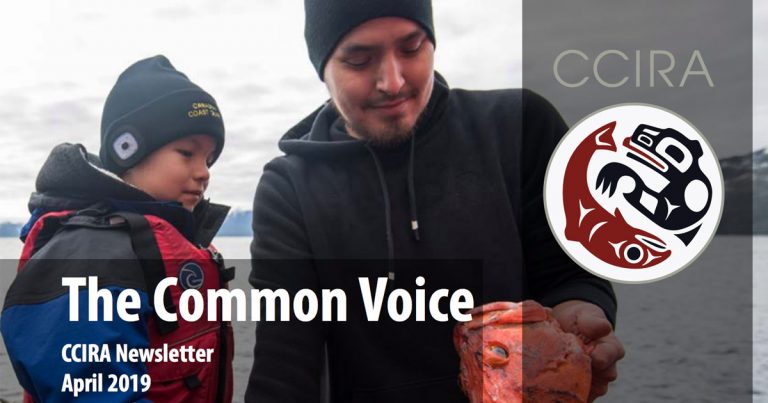Crab Research Shows Impact of Fisheries in our Territories

Our Nations have completed the first major study of Dungeness crab on the central coast and the results are clear: commercial and recreational fishing can have a negative impact on crab populations and our food fisheries. The study also demonstrated our Nation’s capacity to enforce protective measures under indigenous law when resources in our territories are under strain and the Department of Fisheries and Oceans (DFO) fails to act.
Crab is an important traditional food for all our communities, and our people are concerned about the sustainability of the stocks. As fishing pressure has increased across the central coast, our people have found it more difficult to catch crab for Food, Social and Ceremonial (FSC) purposes.
“In recent years we’ve noticed commercial crab fishers coming into our territory on top of a heavy recreational and food fishery, says Nuxalk Guardian Watchmen Ernie Talio. “We think it’s important to scientifically gage the impact of all that fishing pressure on the crab populations.”
Applying indigenous laws to support science
Under the direction of CCIRA’s Science Coordinator Alejandro Frid, our Nations initiated a research project aimed at assessing the impact of recreational and commercial fishing on Dungeness crab within our territories. As the first scientific research project of its kind on the central coast, this project also fills a gap in the scientific knowledge of crab in this region that has not been addressed by DFO research.
The project involved 10 sites open to recreational and commercial fishing and 10 sites designated as experimental crab fishing closures under indigenous law. Closed sites were determined by our community’s marine planning processes and focused on areas of particular importance to our FSC fisheries. Unfortunately, the DFO chose not to recognize or enforce these closures.
Accordingly, our Watchmen took matters into their own hands by monitoring the closures and educating fishers about crab declines and our research. When Watchmen asked fishers to voluntarily pull their traps, most complied.
Adult male crabs became larger and more plentiful at the sites that were closed to recreational and commercial crab fishing.
The study examined two classes of crabs: those that are legally fished (adult males over 154 mm across) and those that are not (females and juvenile males).
The results published in Global Ecology and Conservation revealed that, legal-size adult male crabs became larger and more plentiful at the sites that were closed to recreational and commercial crab fishing. By comparison, the number and size of adult male crabs declined at open sites. These findings confirm that the experimental closures reduced mortality of legal-size males from fishing, but also gave them a chance to bounce back.
“These results are consistent with other studies showing that marine sanctuaries free from fishing can help populations recover,” writes Alejandro. This work illustrates why implementing the spatial plans we created during the MaPP process – and creating new marine protected areas – can help contribute to the long-term sustainability of marine resources in our territories.
“long-term conservation solutions require collaboration in research and management between federal and indigenous governments to be successful.” — Alejandro Frid, CCIRA Science Coordinator.

Conservation requires greater collaboration
By creating effective spatial closures for research this project has also illustrated the importance of traditional knowledge and the use of indigenous laws for conservation.
However, the long-term knowledge held by our hereditary chiefs and other elders exceeds scientific data sets for numerous other resources as well. When deemed necessary by hereditary chiefs, applying indigenous laws to protect resources can be an effective tool for many modern marine conservation issues. However, to achieve our resource management goals our Nations need greater buy-in from the upper levels of government agencies like DFO.
Applying indigenous laws to protect resources can be an effective tool for many modern marine conservation issues.
“Long-term conservation solutions require collaboration in research and management between federal and indigenous governments to be successful,” writes Alejandro. For this particular project, DFO scientists, Jason Dunham and Zane Zhang, generously leant their time and expertise to advise on the study design and analysis. We are hopeful that Canada’s new federal government will enhance collaboration with our Nations at a larger scale and begin to integrate indigenous laws into co-management of fisheries within our territories.






